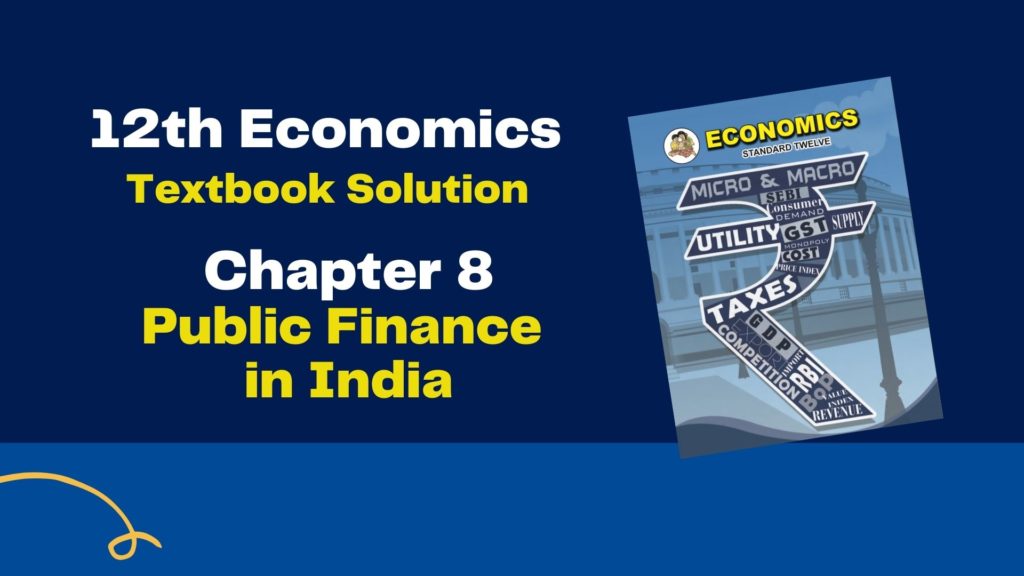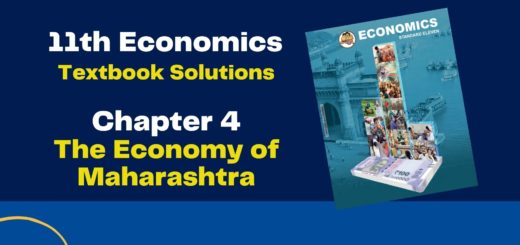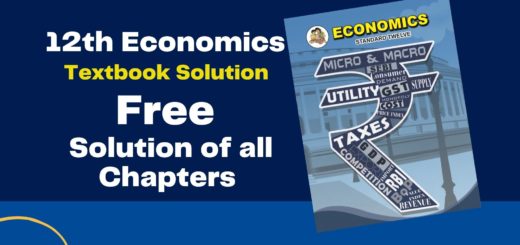12th Economics Chapter 8 Solutions (Public Finance in India) Maharashtra Board – Free Solution
Table of Contents
12th Economics Chapter 8 Solutions

Chapter 8 – Public Finance in India
Q. 1. Choose the correct option
1) Optional functions of Government :
a) Protection from external attack
b) Provision of education and health services
c) Provision of social security measures
d) Collection of tax
Options :
1) b and c
2) a, b and c
3) b, c and d
4) All of the above
2) Obligatory functions of the Government :
a) Provision of employment
b) Maintaining internal law and order
c) Welfare measures
d) Exporting goods and services
Options :
1) c and d
2) a and b
3) only b
4) a, c and d
3) “Definition – Public finance is one of those subjects which are on the borderline between economics and politics.” – is given by:
a) Adam Smith
b) Alfred Marshall
c) Prof. Hugh Dalton
d) Prof. Findlay Shirras
Options :
1) only a
2) only b
3) only c
4) only d
4) Non-tax sources of revenue:
a) Direct and Indirect Tax
b) Direct Tax and Fees
c) Fees
d) Special Levy
Options :
1) b and c
2) a and c
3) a, b, c and d
4) c and d
5) Trends shown by Public expenditure of any Government shows following trend.
a) Constant
b) Increasing
c) Decreasing
d) Fluctuating
Options :
1) only a
2) only b
3) only c
4) only d
6) Identify the right group of pairs from the given options.
| i) Direct tax | a) Non-tax revenue |
| ii) Indirect tax | b) Inflation |
| iii) Fees and Fines | c) GST |
| iv) Surplus budget | d) Personal income tax |
Options :
a) i-d ii-c iii-b iv-a
b) i-c ii-d iii-a iv-b
c) i-d ii-c iii-a iv-b
d) i-a ii-b iii-c iv-d
Q. 2. Distingwish between following concepts
1) Public finance and Private finance.
| Points | Public Finance | Private Finance |
| 1) Meaning | Public finance studies the income and expenditure activities of the state or government. | Private Finance studies income and expenditure activities of private individuals and private entities. |
| 2) Determination of expenditure | The government first determines the volume and different ways of its expenditure. | An individual considers his income and then determines the volume of expenditure |
| 3) Credit status | High degree of credit in the market | Credit of a private individual is limited |
2) Internal debt and External debt.
| Points | Internal Debt | External Debt |
| 1) Meaning | When a government borrows from its citizens, banks, central bank, financial institutions, business houses etc. within the country, it is known as internal debt. | When a government borrows from foreign governments, foreign banks or institutions, international organizations like International Monetary Fund, World Bank etc., it is known as external debt. |
| 2) Currency | Use of domestic currency | Use of foreign currency |
| 3) Nature of Management | Internal debt is less complex for management. | External debt is more complex for management. |
3) Developmental expenditure and Non-Developmental expenditure.
| Points | Developmental Expenditure | Nondevelopmental Expenditure |
| 1)Meaning | The expenditure which results in generation of employment, increase in production, price stability etc. is known as developmental expenditure. | The government expenditure which does not yield any direct productive impact on the country is called non-developmental expenditure. |
| 2) Examples | Expenditure on health, education, industrial development, social welfare, Research and Development (R & D) etc. | Administration costs, war expenditure etc. These are unproductive in nature. |
4) Special assessment and Special levy.
| Points | Special Assessment | Special Levy |
| 1)Meaning | The payment made by the citizens of a particular locality in exchange for certain special facilities given to them by the authorities is known as ‘special assessment.’ | This is levied on those commodities, the consumption of which is harmful to the health and well-being of the citizens. |
| 2) Examples | Local bodies can levy a special tax on the residents of a particular area where extra/special facilities of roads, energy, water supply etc. are provided. | Duties levied on wine, opium and other intoxicants. |
5) Direct Tax and Indirect tax.
| Points | Direct Tax | Indirect Tax |
| 1)Meaning | Direct tax is paid by an individual directly to the government. A taxpayer cannot transfer this liability to another entity or person. | An individual pays indirect tax to the government but through an intermediary. This intermediary then passes it on to the government. |
| 2) Examples | For example – personal income tax, wealth tax, etc. | Goods and Services Tax [GST] |
| 3) Nature of tax | Progressive tax, i.e., its rate increases with taxpayer’s income. | Regressive tax, i.e., its rate decreases with increase in income. |
Solution of other subjects
Solution of all Chapters of Economics
1 – 2 – 3A – 3B – 4 – 5 – 6 – 7 – 8 – 9 – 10
Q.3. State with reasons whether you agree or disagree with the following statement
1) Obligatory function is the only function of the Government.
Ans: No, I disagree with this statement.
Reason: a) Government is a formal or informal institution created by the people in a specific region to perform various functions.
b) These functions of the government can be classified as Obligatory functions and Optional functions
c) Protection from external attacks, maintaining internal law and order, etc. are obligatory functions of
the government.
d) Provision of education and health services, provision of social security like pensions and other welfare
measures, etc. are optional functions of the government.
Hence, Obligatory function is the only function of the Government.
2) Fines and penalties are a major source of revenue for the Government.
Ans: No, I disagree with this statement.
Reason: a) The government imposes fines and penalties on those who violate the laws of the country.
b) The objective of the imposition of fines and penalties is not to earn income, but to discourage the
citizens from violating the laws framed by the Government.
c) For example, fines for violating traffic rules. However, the income from this source is small.
d) Therefore, Fines and penalties are not a major source of revenue for the Government.
3) The goods and services tax (GST) has replaced almost all indirect taxes in India.
Ans: Yes, I agree with this statement.
Reason: a) The Goods and Services Tax [GST] came into effect in India on July 1, 2017.
b) GST is different from an excise or sales tax imposed as a single-stage levy on the manufacture or sale of a product.
c) It is a comprehensive tax base with nationwide coverage of goods and services.
d) Hence, The goods and services tax (GST) has replaced almost all indirect taxes in India.
4) Democratic Governments do not lead to an increase in public expenditure.
Ans: No, I disagree with this statement.
Reason: a) Public expenditure is that expenditure that is incurred by the public authority for the protection of their citizens, for satisfying their collective needs, and for promoting their economic and social welfare.
b) Majority of the countries in the world are democratic in nature.
c) A democratic form of government is expensive due to regular elections and other such activities.
d) This results in an increase in the total expenditure of the government.
e) Hence, Democratic Governments lead to an increase in public expenditure.
5) Public finance is more elastic than private finance.
Ans: Yes, I agree with this statement.
Reason: a) Public finance refers to the income and expenditure of public authorities, whereas, private finance is the income and expenditure of individuals and private sector organizations.
b) The main objective of public finance is to offer a maximum social advantage, while the main motive of private finance is to fulfill private interests.
c) Public finance is more elastic compare to private finance because credit provision is much more in the market to increase public finance but, credit availability is limited to increase private finance.
d) Thus, Public finance is more elastic than private finance.
Q.4. Read the given passage and answer the questions
“The conventional notion of social security is that the government would make periodic payments to look after people in their old age, ill-health, disability, and poverty. This idea should itself change from writing a cheque for the beneficiary to institutional arrangements to care for beneficiaries, including by enabling them to look after themselves, to a large extent.
The write-a-cheque model of social security is a legacy from the rich world at the optimal phase of its demographic transition when the working population was numerals enough and earning enough to generate the taxes to pay for the care of those not working. This model is ill-suited for less, well-off India with growing life expectancy, increasing urbanization, and resultant migration. Social security under urbanization will be different from social security in a static society.
1) State the conventional notion of social security.
Answer: The conventional notion of social security is that the government would make periodic payments to look after people in their old age, ill-health, disability, and poverty.
2) What kind of conceptual change is suggested in the given paragraph.
Answer: Conceptual change suggested in the given paragraph is writing a cheque for the beneficiary to institutional arrangements to care for beneficiaries, including by enabling them to look after themselves, to a large extent.
3) What is the legacy of social security from the rich world?
Answer: Optimal phase of its demographic transition is a legacy of social security from the rich world.
4) Which features of India make the traditional model of social security ill-suited for the economy?
Answer: The transitional model is ill-suited for less, well-off India with growing life expectancy, increasing urbanization, and resultant migration. Social security under urbanization will be different from social security in a static society.
Solution of other subjects
Solution of all Chapters of Economics
1 – 2 – 3A – 3B – 4 – 5 – 6 – 7 – 8 – 9 – 10
Q.5. Answer the following
1) State the types and importance of Government budget.
Answer: The budgetary provisions of public expenditure and revenue need to be at different levels as per the changing needs of the economy. Accordingly, the Government budget is of three types :
1) Balanced Budget:
The government budget is said to be balanced when the estimated revenue and expenditure of the government are equal.
That is, Government Receipts = Government Expenditure.
2) Surplus Budget:
The government budget is said to be surplus when estimated Government receipts are more than the estimated Government expenditure.
i.e. anticipated Government Receipts > estimated Government Expenditure.
3) Deficit Budget:
The government budget is said to be a deficit when anticipated Government receipts are less than the estimated Government expenditure.
That is, anticipated Government Receipts < estimated Government expenditure.
Importance of Government Budget:
a) Union Budget is important because it affects people and the economy in general in a number of ways.
b) Taxes are the most interesting part of any budget. Taxes determine the fate of businesses and individuals. The level of disposable income of the taxpayers depends on the tax rates presented in the budget.
c) Government expenditure on various heads such as defence, administration, infrastructure, education, and health care, etc. affects the lives of the citizens and overall economy.
d) Budget is important because Governments use it as a medium for implementing economic policies in the country.
e) Budgetary actions of the Government affect production, size, and distribution of income and utilization of human and material resources of the country.
2) Explain the principles of taxation.
.Answer: Adam Smith, the founder of Modern economics propounded the following four canons (Principles) of taxation
1) Canon of Equity or Equality:
Smith suggested that every person will pay the taxes to the government in proportion to his ‘ability to pay’. It means rich people should pay more tax compared to the poor.
2) Canon of Certainty:
According to Smith, the taxpayer should know in advance how much tax he has to pay, at what time he has to pay the tax and in what form the tax is to be paid to the government.
3) Canon of Convenience:
According to this canon, every tax should be levied in such a manner and at such a time that it becomes convenient to the taxpayer.
4) Canon of Economy:
According to this canon, the cost of tax collection should be the minimum. If a major portion of the tax proceeds is spent on the tax collection itself, then such a tax cannot be considered as a good tax.
3) Explain non-tax sources of revenue of the Government.
Answer: Public revenue received by the government administration, public enterprises, gifts, and grants, etc. are called as non-tax revenue. These sources are different than the taxes. Brief information about these sources are as follows
1) Fees:
A tax is paid compulsorily without any return service whereas, a fees is paid in return for certain specific services rendered by the government. For example- education fees, registration fees, etc.
2) Prices of public goods and services:
Modern governments sell various types of commodities and services to the citizens. A price is a payment made by the citizens to the government for the goods and services sold to them. For example- railway fares, postal charges, etc.
3) Special Assessment:
The payment made by the citizens of a particular locality in exchange for certain special facilities given to them by the authorities is known as ‘special assessment.’ For example- local bodies can levy a special tax on the residents of a particular area where extra/ special facilities of roads, energy, water supply etc. are provided.
4) Fines and Penalties:
The government imposes fines and penalties on those who violate the laws of the country. The objective of the imposition of fines and penalties is not to earn income, but to discourage the citizens from violating the laws framed by the Government. For example, fines for violating traffic rules. However, the income from this source is small.
5) Gifts, Grants, and Donations:
The government may also earn some income in the form of gifts by the citizens and others. The government may also receive grants from foreign governments and institutions for general and specific purposes. Foreign aid has become an important source of development finance for a developing country like India.
6) Special levies:
This is levied on those commodities, the consumption of which is harmful to the health and well-being of the citizens. Like fines and penalties, the objective is not to earn income, but to discourage the consumption of harmful commodities by the citizens. For example- duties levied on wine, opium, and other intoxicants.
7) Borrowings:
The government can borrow from the people in the form of deposits, bonds, etc. It also gets loans from foreign governments and organizations such as IMF, World Bank, etc. Loans are becoming more and more popular source of revenue for governments in modern times.
(Note: Write any four points)
Solution of other subjects
Solution of all Chapters of Economics
1 – 2 – 3A – 3B – 4 – 5 – 6 – 7 – 8 – 9 – 10
Q.6. Answer in detail
1) Explain various reasons for the growth of public expenditure.
Answer: It is observed that there is a continuous growth in public expenditure in a developing country like India.
Following are some of the important reasons :
1) Increase in the Activities of the Government:
The modern government performs many functions such as the spread of education, public health, public works, public recreation, social welfare schemes, etc. It is observed that new functions are continuously being undertaken and old functions are being performed more efficiently on a large scale by the government. This leads to an increase in public expenditure.
2) Rapid Increase in Population:
The population of developing countries like India is increasing fast. In the 2011 Census, it was 121.02 crores. As a result, the government has to incur greater expenditure to fulfill the needs of the increasing population.
3) Growing Urbanization:
The spread of urbanization is a global phenomenon of the day. This leads to an increase in the government expenditure on water supply, roads, energy, schools and colleges, public transport, sanitation, etc.
4) Increasing Defence Expenditure:
In modern times, defence expenditure of the government is increasing even in peacetime due to unstable and hostile international relationships.
5) Spread of Democracy:
The majority of the countries in the world are democratic in nature. A democratic form of government is expensive due to regular elections and other such activities. This results in an increase in the total expenditure of the government.
6) Inflation:
Just like a private individual, the government has to buy goods and services from the market for the spread of economic and social development. Normally, prices show a rising trend. Due to this, the government has to incur increasing costs.
7) Industrial Development:
Industrial development leads to an increase in production, employment, and overall growth in the economy. Hence, the government makes huge efforts for implementing various schemes and programmes for industrial development. This results in an increase in government expenditure.
8) Disaster Management:
Many natural and man-made calamities like earthquakes, floods, cyclones, social unrest, etc. are occurring more frequently. The government has to spend a huge amount on disaster management which increases total expenditure.
Modern governments are working for the ‘welfare state’. Hence, there is a continuous increase in public expenditure.
Extra Questions
Answer the following questions.
Solution of all Chapters of Economics
| Chapter Name | Solution Link |
| 1) Introduction to Micro and Macro Economics | Click Here |
| 2) Utility Analysis | Click Here |
| 3A) Demand Analysis | Click Here |
| 3B) Elasticity of Demand | Click Here |
| 4) Supply Analysis | Click Here |
| 5) Forms of Market | Click Here |
| 6) Index Numbers | Click Here |
| 7) National Income | Click Here |
| 8) Public Finance in India | Click Here |
| 9) Money Market and Capital Market in India | Click Here |
| 10) Foreign Trade of India | Click Here |
Check out other posts related to the 12th Commerce
| Textbook Solutions of 12th Commerce (All Subjects) | Click Here |
| Free pdf of 12th Commerce Textbooks | Click Here |
| 12th Commerce IT MCQ Preparation (Online Test) | Click Here |
| 12th Commerce Paper Pattern and Chapter Wise Marks Distribution | Click Here |
| Sample Paper of 12th Commerce for Practice | Click Here |
| Solved Sample papers of 12th Commerce to improve Paper Presentation | Click Here |
| Old Question Papers of 12th Commerce with solution (All Subjects) | Click Here |


